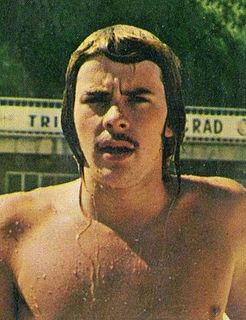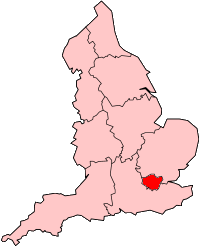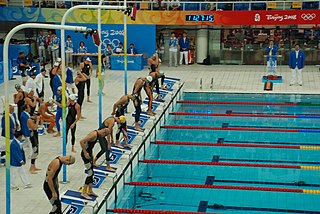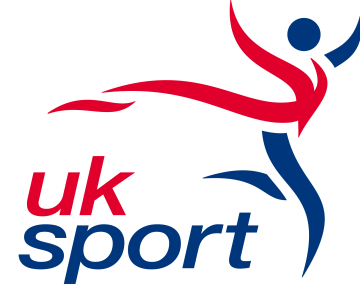
David Andrew Wilkie, MBE is a Scottish former competitive swimmer who was Olympic and Commonwealth Games champion in the 1970s. He is the only person to have held British, American, Commonwealth, European, world and Olympic swimming titles at the same time and was the first British swimmer to win an Olympic gold medal since Anita Lonsbrough in 1960.
Jan Hempel is a German diver who competed at the 1988, 1992, 1996, and the 2000 Summer Olympics, winning two Olympic medals. Hempel won a silver in 10 m Platform and a bronze medal in 10 m synchronized platform. He also competed on the 3m springboard, scoring "the second best dive of all time" in Vienna in 1993.

The sport of swimming is the second biggest participation sport in the UK and as the nation strives to improve its health and fitness, the popularity of swimming continues to grow. Teaching, Training and participating in competitive swimming is very active in Kent.

Diving was first introduced in the official programme of the Summer Olympic Games at the 1904 Games of St. Louis and has been an Olympic sport since. It was known as "fancy diving" for the acrobatic stunts performed by divers during the dive. This discipline of Aquatics, along with swimming, synchronised swimming and water polo, is regulated and supervised by the International Swimming Federation (FINA), the international federation (IF) for aquatic sports.

The Irish Amateur Swimming Association (IASA) was the national governing body of swimming in Ireland. The organisation was founded in 1893 and held responsibility for the various aquatic disciplines until it was dissolved in January 1999 following a series of sexual abuse scandals.

Thomas Robert Daley is a British diver. He specialises in the 10-metre platform event and is a double World champion in the event; he won the 2009 FINA World Championship in the individual event at the age of 15, before regaining it in 2017. He was the 2012 Olympic bronze medalist in the event.
Swim England is the brand name for the Amateur Swimming Association, the first sport governing body of swimming to be established in the world and today remains the English national governing body for swimming, diving, water polo, open water swimming, and synchronised swimming. It is closely linked with British Swimming, a federation of the national governing bodies of England, Scotland, and Wales. These three are collectively known as the Home Country National Governing Bodies.

The John Charles Centre for Sport is a sports facility in South Leeds, West Yorkshire, England. It was previously named the South Leeds Stadium and was renamed to honour John Charles (1931–2004), the former Leeds United, Juventus F.C. and Wales footballer. It is located to the south of Leeds city centre roughly on the border of Beeston, Belle Isle and Hunslet. The sports centre opened in 1996.

Maxine Joyce "Micki" King is an American former competitive diver and diving coach. She was a gold medal winner at the 1972 Summer Olympics in the three meter springboard event.

James Edward ("Eddie") Heron was an Irish high diving and springboard diving champion. He won the British Diving Championship in 1932 and represented Ireland at the 1948 Olympic Games.

The sport of swimming is the second biggest participation sport in the UK and as the nation strives to improve its health and fitness, the popularity of swimming continues to grow. Teaching, Training and participating in competitive swimming is very active in London.
Gavin Brown, sometimes listed as Gavin Hustler-Brown, was a diver from Cottingley, Bradford in West Yorkshire, England. The former diving partner of Olympian Blake Aldridge, Brown died at the age of 22 following a hit-and-run incident.
Christopher Snode is a former World Cup Champion diver who represented Great Britain at the 1976 Summer Olympics, 1980 Summer Olympics, and 1984 Summer Olympics. He represented England at the 1978 and 1982 Commonwealth Games, and won four gold medals. Snode was the University of Florida's first individual NCAA National Champion (1978). At the first-ever FINA Diving World Cup held in The Woodlands, Texas in 1979, Snode became World Cup Champion in the men's three-metres springboard event.

Anabelle "Belle" Smith is an Australian diver. She competed in the 3 m springboard synchronised event at the 2012 and 2016 Summer Olympics, and won a bronze medal in 2016, placing fifth in 2012.

Christopher James Mears is a British diver and DJ/Producer from Burghfield Common, near Reading, Berkshire. He competed at the 2016 Summer Olympics in the synchronised 3m springboard event with Jack Laugher and won gold, the first Olympic gold medal for Britain in diving.
The West London Penguin Swimming and Water Polo Club is a masters swimming and water polo club based in London. It is an Amateur Swimming Association (ASA) registered club in the London region. The masters swimming teams are composed of male and female swimmers of all ages, with an intermediate level for casual and former competitive swimmers and the advanced level for more experienced and competitive swimmers. Some swimmers are also nationally ranked.
The club has a number of water polo teams, with the competition level teams participating at the highest level in the British Water Polo League. Club member Francesca Snell was selected to the Great Britain Olympic Water Polo team for the London 2012 Olympic Games.

Daniel "Dan" Goodfellow is a British diver and an Olympic bronze medalist. He first represented Great Britain as a senior at the 2013 European Diving Championships in the 10 m platform event and the 2013 World Aquatics Championships in the same event. Goodfellow won a bronze medal in the Men's 10m Synchronised Platform event with his diving partner Tom Daley at the 2016 Summer Olympic Games in Rio de Janeiro. He has also won a gold with Daley in the same event at the Commonwealth Games, and a silver at the European Championships.
Oliver Dingley is an international diver who represents Ireland. He represented Ireland at the 2016 Summer Olympics. In doing so, he became the first Irish Diver to compete at the Olympics in 68 years. RTÉ’s highest rating sports event at the 2016 Olympics was Dingley’s 3m springboard final, with an average of 388,000 viewers. Dingley has won numerous national and international medals.





















